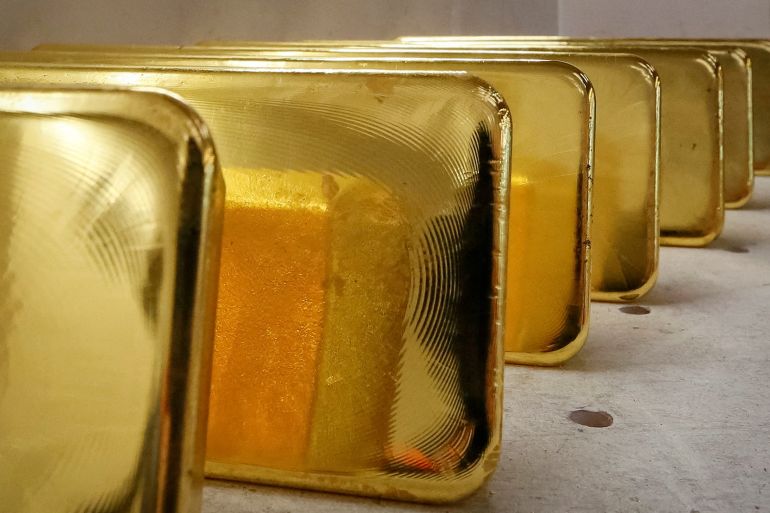EU envoys agree Russian gold embargo, freeze on Sberbank assets
EU set to impose a seventh round of sanctions on Russia over its invasion of Ukraine, including on its biggest lender.

European Union diplomats meeting in Brussels have agreed a new round of sanctions against Moscow for its war in Ukraine, including a ban on importing gold from Russia and freezing the assets of the country’s top lender Sberbank.
It is the seventh EU package of sanctions on Russia. The last one passed in June imposed a ban on most Russian oil imports.
Keep reading
list of 3 itemsSyria, a close Russia ally, breaks diplomatic ties with Ukraine
Russia-Ukraine war: List of key events, day 147
“The main goal is to align with G7 partners, reinforce the implementation and close the loopholes where necessary,” the Czech government, which holds the EU’s rotating presidency, tweeted on Wednesday.
Russia is the second-largest gold-producing nation in the world. Gold exports are a significant source of revenue for Russia in terms of their ability to transact with the global financial system.
Last year, they were worth $15.45bn and wealthy Russians have been buying bullion to reduce the financial effect of Western sanctions.
#COREPERII | ✅ Ambassadors approved the next sanctions package in response to the Russian aggression against Ukraine 🇺🇦. The new measures will align the EU with G7 partners, reinforce implementation and close loopholes where necessary. #EU2022CZ
— EU2022_CZ (@EU2022_CZ) July 20, 2022
As she proposed the measures to member states last week, EU Commission President Ursula von der Leyen said thy would help enforce earlier sanctions more effectively and extend them until January 2023.
“Moscow must continue to pay a high price for its aggression,” she added.
The embargo on gold imports fulfils a decision agreed by the world’s most industrialised nations at a G7 meeting in late June in which EU members Germany, France and Italy took part.
The sanctions will also freeze the assets of Russian bank Sberbank and add several people and entities to its blacklist.
The measures also unblock assets at Russian banks linked to trade in food and fertiliser in an effort to respond to Moscow’s allegations that the sanctions are causing a food crisis.
This was a “commitment that sanctions won’t endanger the food and energy security around the world,” the Czech government said.
Crucial shipments across the Black Sea have been blocked both by Russian warships and mines Kyiv has laid to avert a feared amphibious assault.
The food shortages have raised the risk of famine for tens of millions of people in poorer nations, particularly in Africa, where leaders have complained to the EU about the banking sanctions.
Six previous rounds of sanctions have targeted Russia’s economy, financial system, central bank, top government officials, as well as Russian President Vladimir Putin and his inner circle.
Some of the punitive measures only started going into effect last month after a transition period.